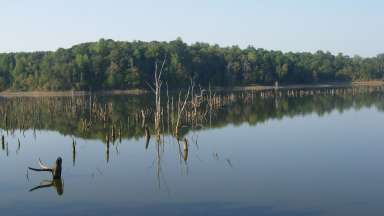Jump To:
A drought is a prolonged period of abnormally low rainfall, leading to a shortage of water.
Risks associated with drought
- Increased risk of wildfire
- Increased risk of dust storms
Before and after a drought
Before a drought
Strategies for drought preparedness focus mainly on water conservation. Even under normal rainfall conditions, water conservation measures can save energy and money in your home.
During a drought
Always observe state and local restrictions on water use during a drought. If restricted, do not water your lawn, wash your car, or use water for other non-essential tasks, to help ensure there is enough water for essential uses.
Some useful tips to reduce household water consumption include:
- Repair dripping faucets and showers.
- Check all plumbing for leaks and have any leaks repaired by a plumber.
- Retrofit all household faucets by installing aerators with flow restrictors.
- Insulate your water pipes to reduce heat loss and prevent them from breaking.
- Choose appliances that are more energy and water efficient
- Consider purchasing a low-volume toilet that uses less water than older models.
- Replace your showerhead with an ultra-low-flow version.
- Start a compost pile as an alternate method of disposing of food waste or simply dispose of food in the garbage. (Kitchen sink disposals require a lot of water to operate properly).
- Plant native and/or drought-tolerant grasses, ground covers, shrubs and trees.
- Use mulch to retain moisture in the soil. Mulch also helps control weeds that compete with landscape plants for water.
- Position sprinklers so water lands on the lawn and shrubs and not on paved areas.
- Check sprinkler systems and timing devices regularly to be sure they operate properly.
- Plant drought-resistant lawn seed. Reduce or eliminate lawn areas that are not used frequently.
- Avoid over-fertilizing your lawn. Applying fertilizer increases the need for water. Apply fertilizers that contain slow-release, water-insoluble forms of nitrogen.
- Turn irrigation down in fall and off in winter. Water manually in winter only if needed.
Indoor water conservation tips while in a drought
Bathroom
- Avoid flushing the toilet unnecessarily. Dispose of tissues, insects, and other similar waste in the trash rather than the toilet.
- Avoid taking baths - take short showers - turn on water only to get wet and lather and then again to rinse off.
- Avoid letting the water run while brushing your teeth, washing your face, or shaving.
- Place a bucket in the shower to catch excess water for watering plants.
Kitchen
- Operate automatic dishwashers only when they are fully loaded. Use the “light wash” feature, if available, to use less water.
- Hand wash dishes by filling two containers - one with soapy water and the other with rinse water containing a small amount of chlorine bleach.
- Clean vegetables in a pan filled with water rather than running water from the tap.
- Store drinking water in the refrigerator. Do not let the tap run while you are waiting for water to cool.
- Avoid wasting water while waiting for it to get hot. Capture it for other uses such as plant watering or heat it on the stove or in a microwave.
- Avoid rinsing dishes before placing them in the dishwasher; just remove large particles of food. (Most dishwashers can clean soiled dishes very well, so dishes do not have to be rinsed before washing)
- Avoid using running water to thaw meat or other frozen foods. Defrost food overnight in the refrigerator or use the defrost setting on your microwave oven.
Laundry
Operate automatic clothes washers only when they are fully loaded or set the water level for the size of your load.
Resources
More Drought information and tips from Ready.gov
North Carolina Drought Management Advisory Council provides up-to-date information on drought conditions throughout the state.
